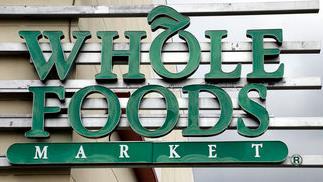How Walmart, Whole Foods, Kroger and other grocery retailers' overall prices compare
Whole Foods shoppers may want to keep an eye on their wallets as they peruse the store's aisles. Despite its recent attempt to dissolve its pricey image, the supermarket chain — which dubs itself "America's healthiest grocery store" — still topped a list of food chains with the highest overall prices this week.
The grocery giant was named the most expensive chain, with prices averaging a whopping 34 percent above Walmart, according to CNBC, which cited a Tuesday report by Bank of America Merrill Lynch analysts. Walmart had the lowest prices overall, while Kroger and Sprouts Farmers Market saw an average premium of 7 and 8 percent, respectively.
The data was based on 10 pricing studies conducted throughout eight different metro areas within the past year, the news site explained, adding that the "last of these occurred in May" after Whole Foods slashed prices on more than 500 items. Amazon announced the massive price cuts in early April, telling customers at the time they could expect to save an average of 20 percent on "select items" throughout the store and Prime members could save an additional 10 percent on top of that.
“When Whole Foods Market joined the Amazon family, we set out to make healthy and organic food more accessible. Over the last year, we’ve been working together tirelessly to pass on savings to customers,” Jeff Wilke, CEO of Amazon Worldwide Consumer, said in a statement to Fox Business last month.
But it appears Whole Foods didn't bring prices down nearly enough to match its competitors.
“In our most recent price study in Philadelphia, Whole Foods’ basket was still priced at a +39% premium to Walmart. Produce [was] still at a +25% basket premium to Walmart, and center-of-store items at a +58% premium to Walmart,” Bank of America analyst Robert Ohmes told CNBC.
CLICK HERE TO GET THE FOX BUSINESS APP
Other big food grocers such as Kroger and Walmart have also been attempting to keep prices low in recent months. New delivery options may be another potential way for the chains to cut costs.
Walmart announced plans for its next-day delivery rollout on Tuesday — just weeks after Amazon said it would invest $800 million to offer free one-day shipping to its Prime members. Amazon didn't immediately provide a timeline for the new option. In what many consider a jab to Amazon, Walmart said it would offer consumers next-day delivery on a "wide range of general merchandise" worth $35 or more without a membership fee.
| Ticker | Security | Last | Change | Change % |
|---|---|---|---|---|
| WMT | WALMART INC. | 124.87 | -1.75 | -1.38% |
| WFM | NO DATA AVAILABLE | - | - | - |
| KR | THE KROGER CO. | 67.63 | -1.23 | -1.78% |
"Our new NextDay delivery isn’t just great for customers, it also makes good business sense. Contrary to what you might think, it will cost us less – not more – to deliver orders the next day. That’s because eligible items come from a single fulfillment center located closest to the customer. This means the order ships in one box, or as few as possible, and it travels a shorter distance via inexpensive ground shipping," the company explained in an online statement.
To better compete with chains such as Walmart and Kroger, Amazon is reportedly planning to launch a lower-price grocery chain — separate from Whole Foods — of its own in several major U.S. cities over the next few years.
Fox Business' Jade Scipioni contributed to this report.




















